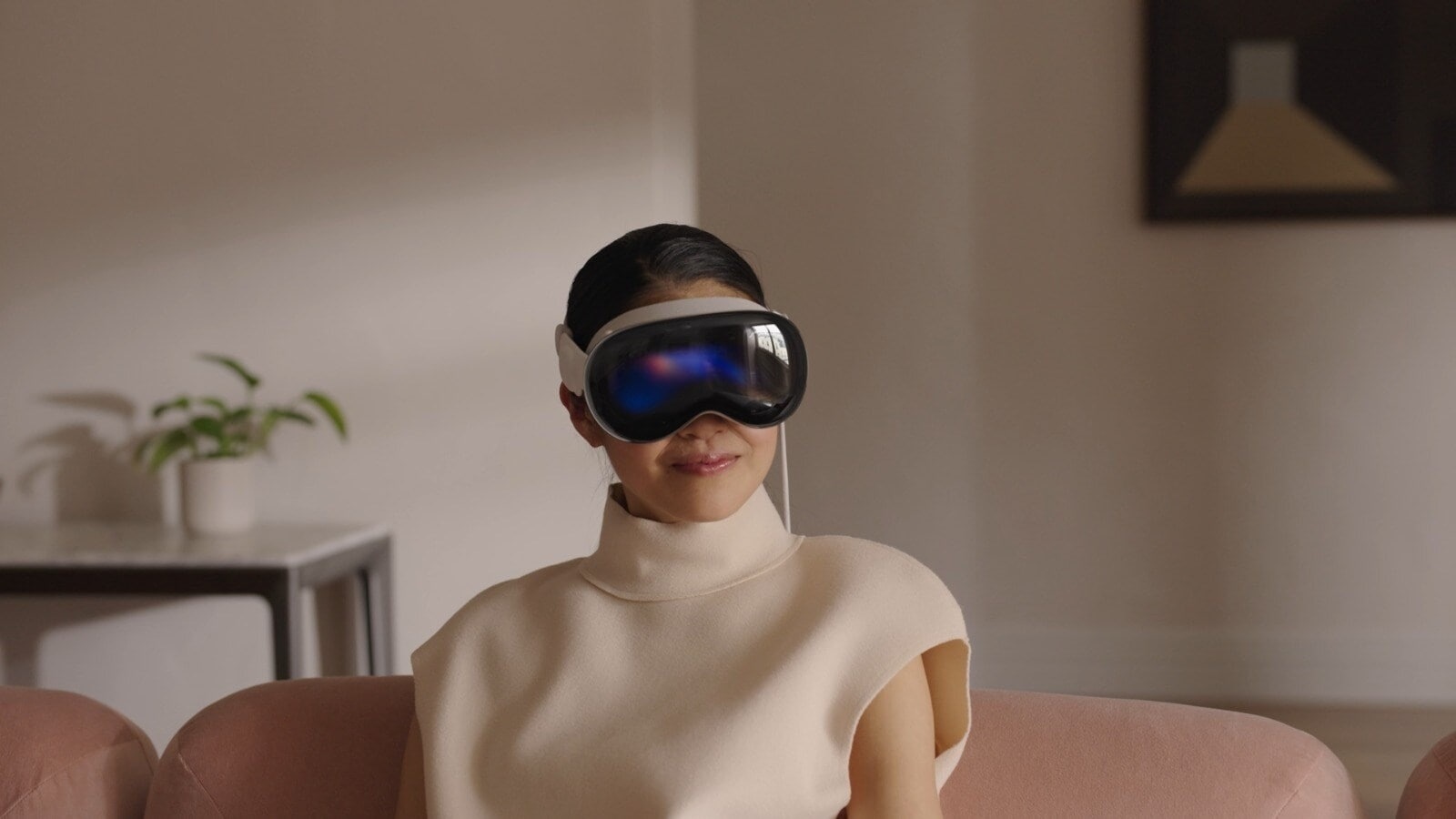Apple Vision Pro headset: Meta Can Ride Apple’s Coattails to Victory in Mixed Reality
The new $3,500 Apple Vision Pro headset is generating a rising tide of interest in the metaverse. How can Mark Zuckerberg capitalize? Fitness.

It's generally accepted that Mark Zuckerberg, in the two years since he renamed Facebook to Meta Platforms Inc., has done a poor job of selling his metaverse vision to the masses. The words “metaverse,” “virtual reality” and “augmented reality” have all become so tainted, in fact, that the newest arrival in the sector refuses to use any of them. Instead it touts “spacial computing” when describing the Apple Vision Pro headset, which is being released early next month.
Will spacial computing prove more marketable than the metaverse? Maybe. The Vision Pro release will for sure bring a renewed buzz around the mixed-reality concept that only Apple can generate thanks to its impeccable reputation for hardware excellence. Given its $3,500 price tag, however, and a limited production run, the Vision Pro's first iteration won't be an iPhone moment. As I've written before, most people's experience of Apple's most daring new device in more than a decade will be to peer at it in one of the company's stores.
We are now on WhatsApp. Click to join.
With that on the horizon, the question reverberating around the corridors at Meta is whether it can use this interest to drive sales of its own headsets. I think it can, and Meta's leadership feels the same way.
“One of the benefits that we'll get as Apple releases their devices,” Vishal Shah, Meta's vice presdient for the Metaverse, said when I met him last week, is that “people will be able to see it, and try it, and use this thing.” He said people will be left thinking: “‘Maybe I can't, and shouldn't, buy a $3,500 device — but I can find something that's more affordable.' If we wanted to build a $3,000-plus device, we could do that. That is not our strategy. Our strategy is to make the device as accessible as possible.” The latest model of Meta's device, the Quest 3, costs $499.
Meta is the market leader in VR and AR though, granted, it's not much of a market. Insider Intelligence estimates 35.6 million people in the US use VR headsets at least once a month. So far, the metaverse has seemed little more than a Zuckerberg folly, a money pit as the company claims to be striving for “efficiency” — a misplaced bet on the future of computing that might have been better placed on going big(ger) on artificial intelligence.
I think this perception is wrong. The metaverse will be worth it. Just think of the possibilities of a completely immersive virtual world, or a digitally enhanced real one. And, besides, Meta has the resources and talent to nurture multiple innovations at once.
What the metaverse does need is a publicity reset. Apple's launch — and the weakness of what seems to be a product with compromises that I'm not sure Steve Jobs would have allowed — provides that opportunity.
Here's how Meta does it. First, do away with any advertising that involves some poor soul awkwardly shuffling about in a home, pretending to be wowed by unappealing virtual worlds where people don't even have legs, let alone personalities. Spare us the keynote demos where executives feign amazement as they collaborate and “hang out.”
If Meta truly wants to sell a significant amount of headsets — which it should, having now spent more than $50 billion working on them — the next ad should be set in my apartment. It's 10 p.m. I'm wearing boxers, socks and little else other than a Meta Quest 3 over my eyes, behind which I'm sweating profusely. I'm prancing about, swinging my arms, lunging and squatting to Aqua's seminal hit “Barbie Girl.” I'm a jiggling, hairy monster of a specimen. But I'm smiling. The screen goes dark. “Quest 3,” the caption reads, “available now.”
Meta's marketing team seems unlikely to go with such a groundbreaking proposal, perhaps out of fear it might air at dinner time. So maybe, then, the campaign could instead be shots of me buying jeans a waist size smaller. Or returning home at Christmas to parents who, for once, tell me I've lost weight. Maybe it shares the data from my Apple Watch that shows me smashing exercise goals out of the park every day for the past two months — ever since the evening I first dived into Supernatural, the VR fitness app. It's a streak of activity I don't think I've ever managed in my life (and certainly not in the four years I've had the watch).
The point is: While gaming was the obvious starting point, fitness is the killer app in the metaverse — a use case that fits like a glove, can draw mass appeal and is one in which Meta has the significant upper hand. Supernatural, which Meta acquired last year after fending off an antitrust investigation, is an addictive blend of form and function that uses Guitar Hero-inspired mechanics and professional coaching to give users a very real work out — soundtracked by an ever-expanding music library. The challenge of securing rights from record labels and publishers has delayed the launch of the app in Europe, but that will likely be resolved soon. An almost-100,000-member strong Facebook group of Supernatural fans is replete with stories of life-changing transformations.
It's this vibe that Meta should be leaning into if it wants to shed the dorky perception it has thus far created around the metaverse. “The number of women who say they bought [Quest] for fitness far exceeds that for any other category,” Shah noted. “If you look at gaming, it skews heavily male versus female. Look at fitness — it's pretty even distribution.”
If you share my view — that fitness is the gateway to mixed-reality adoption — then the weaknesses in Apple's debut product become obvious. The Vision Pro, besides being seven times the price of Quest, requires a cumbersome cable attached to an external battery and uses hands-only inputs rather than the handheld controllers that provide crucial haptic feedback within Meta's system. Meta's suite of fitness apps, built steadily (if not quickly) over the past few years, contrasts sharply with questions about the level of developer enthusiasm around Apple's device. Apple's demos so far have focused on productivity and entertainment consumption rather than action — a surprise, given that it was fitness that won over many of Apple Watch's skeptics. As such, there's a risk it lands on the same trajectory as 3D television, where expense and discomfort becomes too much of a trade-off.
Previously, I viewed the VR/AR sector as a repeat of the smartphone wars, with Meta's Quest as the budget-friendly “Android” to Apple's premium Vision Pro. Now I'm more inclined to say it feels like the Mac versus PC battles of the 1990s and 2000s. Steve Jobs offered sleek hardware and software, but it was Bill Gates who taught the world how to use a computer by making it accessible and affordable. Zuckerberg is wise to focus on mass appeal in VR/AR — and fitness is the way to finally get things moving.
Also read the top stories:
Apple Watch banned or not? After court vase, Apple just got some relief! Know where things stand for Apple now. Read all about it here. If you enjoyed reading this article, please forward it to your friends and family.
Trouble everywhere! The Earth is heating up, as is conflict in the Middle East. The world economy and Ukraine's defense against Russia are sputtering along. Artificial intelligence (AI) could upend all our lives. The to-do list of global priorities has grown for this year's edition of the World Economic Forum. Know where things stand here.
World Inc worried! Global CEOs are increasingly worried about the long term viability of their businesses, a pre-Davos survey showed. Pressure is mounting from artificial intelligence (AI) and climate disruption. Dive in here. If you enjoyed reading this article, please forward it to your friends and family.
Catch all the Latest Tech News, Mobile News, Laptop News, Gaming news, Wearables News , How To News, also keep up with us on Whatsapp channel,Twitter, Facebook, Google News, and Instagram. For our latest videos, subscribe to our YouTube channel.
































